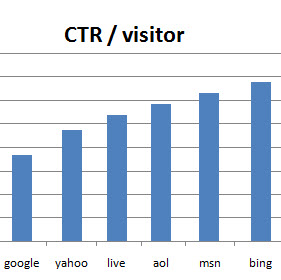 One of the biggest mistakes in internet marketing is failing to understand the true nature of your conversion rate.
One of the biggest mistakes in internet marketing is failing to understand the true nature of your conversion rate.
Conversion rate is such a lousy term, but for many business owners it has come to mean profit.
Unfortunately, businesses that want to provide you with internet marketing services will use the term conversion rate to get your attention and sell you services. But that’s precisely what you don’t want to hear.
Understanding the conversion rate of your website in very important. It tells you if you need to change things, what you need to change, and whether or not you’re doing the right thing. But you really need a deep understanding of the term before you can evaluate whether it means anything.
As I made the point in my earlier conversion rate post, the source of the traffic needs to be part of the conversion rate discussion. Your website’s conversion rate is an average of all the different sources that feed it, but there’s no need to change anything based on that average.
And despite my earlier post, you should know that even the source of the traffic is sometimes meaningless alone. One of the mistakes in internet marketing is to make global changes based on your conversion rate – or to assume that your website is broken based on a poor conversion rate alone.
Let’s use the example of a painting contractor to illustrate the point. Their traffic is coming via Google pay-per-click ads and they’re comparing the conversion rate of their specific keywords. Should the conversion rate of the keywords determine how much they spend in the future and which keywords they concentrate on?
Unfortunately, that question requires your complete understanding of the keywords themselves. Suppose the company is located in Bloomington/Normal IL and is comparing traffic from the two city keywords. The keyword they’ve chosen is Painting Contractor and thus their two keywords are “Bloomington Painting Contractor” and “Normal Painting Contractor”. Since both cities have a similar population makeup and size, comparison seems logical.
But unless they fully understand the nuances of the two – it’s not a good comparison. Adding “Bloomington” to the search means they’re going to get a large number of people searching for painters in the Bloomingtons of Minnesota, Indiana and Michigan – all traffic that is useless to an Illinois painter. And the term “Normal” is much more often used as an adjective than a city name.
So how do you compare them? You don’t. The conversion rate of the Bloomington traffic may be much lower than the conversion rate of the Normal traffic, but that doesn’t mean you should stop buying the Bloomington keyword. In fact, the conversion rate from the Bloomington traffic that originates in Bloomington, IL – not Bloomington MN or Bloomington IN may be higher than that of the Normal keyword.
In this case cancelling or reducing the spend on the Bloomington keyword based on that alone would be one of the mistakes in internet marketing that ultimately lead to more business for your competition. Instead, acknowledge the nuances of the word and PERHAPS limit the ads so they only are displayed to IL customers. Modification could mean great success.
It’s a delicate animal, conversion rate. Have you had any experience with your website’s conversion rate? Chime in!

![Reblog this post [with Zemanta]](http://img.zemanta.com/reblog_e.png?x-id=b24be233-60fd-4d20-89df-25ed0b0585b1)